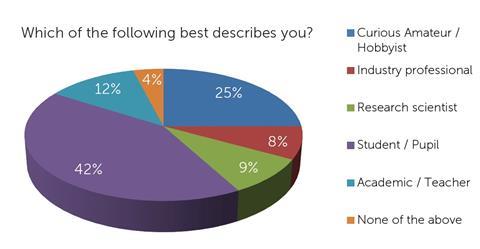Michael Anderson, Jonathan Agger, Stephen Ashworth, Simon Lancaster and Patrick O’Malley explore the trends in teaching chemistry online
The expression MOOC, an acronym of Massive Open Online Course, was originally coined in 2008 by Dave Cormier to describe an online course on Connectivism and Connective Knowledge run by George Siemens and Stephen Downes. This was a connectivist MOOC, or cMOOC, in which the focus was on the community rather than a traditional content-driven university course.
In late 2011, academics at Stanford launched three MOOCs, which attracted hundreds of thousands of enrolments and led to the spin out of Udacity and Coursera as commercial MOOC providers. MIT reacted and was joined by Harvard forming edX in early 2012. The New York Times named 2012 ‘The Year of the MOOC’. While the term MOOC had stuck, these courses were very different to connectivist cMOOCs. The Udacity, Coursera and edX courses, sometimes referred to as xMOOCs, were typically close adaptations of existing university courses, with structures and teaching objectives familiar to any university graduate but delivered wholly online.

Don’t believe the hype
In 2012 and 2013, MOOCs were hyped by the mainstream media as instigating a revolution in higher education, perhaps even heralding the end of the traditional campus university. The ‘failure’ of the MOOC to meet these initial expectations is unlikely to surprise the student of educational technology. Indeed there is a plot, known as the Gartner hype cycle, which such innovations seem to follow. In the UK our response to the technology trigger may have lagged a year behind the US but this has resulted in our being able to smooth out the extremes of inflated expectation and subsequent disillusionment.
Why put on a MOOC?
MOOCs are free for their students at the point they are taken. Some MOOC providers will offer a certificate of accomplishment on ‘completion’ for a small fee. A fraction of courses may have an optional formal assessment associated with them, which will incur a substantial cost to the students. MOOCs may be free to the students who take them, but the production of multimedia teaching materials does not come cheap. The return on investment for a MOOC is not immediately apparent; it seems unlikely that many will directly recoup their costs through the sale of certificates or examination fees. Instead, universities see MOOCs as a means to enhance their allure either as corporate entities pursuing the greater good or by providing a shop window for their courses.
Why teach a MOOC?
The MOOC is an ideal environment in which to refine pedagogical practice. A conventional course runs once a year with perhaps 150 students. A MOOC could run every 10 weeks with 10,000 students. Some educators might not teach 10,000 students during their career. The MOOC then becomes an online laboratory in which pedagogical practice can be tweaked and statistically significant effects determined in a fraction of the time such an investigation would otherwise take. Lessons learnt within a MOOC about the reliability of a multiple choice question or the value of a peer marking rubric can then be applied to campus-based students.
Why take a MOOC?
Much has been written about the demographics of those taking MOOCs: predominantly white, middle class and educated to degree level. The traditional measure of completion rate, normally less than 10%, has been used extensively to deride the mass enrolment MOOC. This argument needs to evolve – in the MOOC model it is the student who owns the definition of success, not the institution. If someone is looking for a taste of separation science, do they really need to collect the final fraction?
Where the MOOC has intrinsic value for a particular group, as in for example Preparing for Uni,1 which helps students with the transition from sixth form to university, cohorts will focus accordingly. Similarly, MOOCs can provide an excellent vehicle for the delivery of continuing professional development, such as Teaching Computing Part 1,2 which has a 41% completion rate.
Chemistry MOOCs

Applying the Gartner hype cycle model specifically to chemistry MOOCs, we are on the slope of enlightenment. The first adopters are exploring and refining what can be done with the technology and evolving pedagogy.3 Chemistry MOOCs are provided by each of the major established platforms.4 Here we present two very different case studies. The first describes an ambitious project to bring an introductory physical chemistry course replete with virtual experiments to the Coursera platform. The second describes a family-friendly introduction to kitchen chemistry delivered through the UK-based FutureLearn.
Case study 1: Introduction to physical chemistry
The Introduction to Physical Chemistry MOOC was selected by The University of Manchester as one of its five initial MOOC offerings to explore the feasibility of delivering laboratory-based subjects such as chemistry with leading MOOC platform provider Coursera. The course design aimed to be pioneering in its use of innovative pedagogy. This included not only the provision of a virtual laboratory for students to conduct experiments and be assessed, but also short focused video screencast lectures interspersed with short quizzes for immediate formative feedback.
Even though the course requirements stated that a good general chemistry and calculus knowledge was desirable, a wide range of participants from quite different backgrounds enrolled on the course.
Because of the differing backgrounds of the students enrolled, the engagement with the material was quite diverse, ranging from browsing just some of the video content to full interaction through the discussion forums and the completion of all assessments and achievement of a statement of accomplishment.
Content
The course covered the principal topics taught in a typical first-year UK undergraduate physical chemistry course. Briefly, the course syllabus was as follows:
- Thermodynamics – Thermodynamic definitions, the zeroth law of thermodynamics and temperature, the first law of thermodynamics and enthalpy, the second law of thermodynamics and entropy, the third law of thermodynamics and absolute entropy, heat capacity, reversible change, Hess’s law, Gibbs energy and spontaneous change
- Chemical kinetics – Reaction rate, effect of stoichiometry, order of reaction, half-life, determining reaction order, molecularity, the Arrhenius equation, collision theory, transition state theory, complex reactions, rate-determining step, steady state approximation and catalysis
- Quantum chemistry – Planck’s constant, the photoelectric effect, de Broglie’s particle waves, Heisenberg’s uncertainty principle, Schroedinger’s wave equation, the free particle, the particle in a box and application to linear polyenes, hydrogenic atoms, Born’s interpretation of the wavefunction, interpretation of radial and angular wavefunctions for hydrogenic atoms.
Delivery
Our campus-based first year module on physical chemistry was selected as suitable for adaptation to an online delivery format. The course is traditionally taught on-campus using two weekly one hour lectures and is accompanied by a laboratory class.
The formal lecture content was delivered using short (10–20 minute) video screencasts. These were interspersed with online quizzes allowing the students to assess their comprehension of the material as they viewed the content. The delivery was mainly achieved using real-time annotation of slides.5 This form of presentation was chosen as it has been proven to enhance learner concentration in online delivery. In addition, footage of interactive clicker sessions with campus-based students was adapted so that the MOOC students could directly participate and compare their performance to that of the campus-based students.
Chemistry is by its nature a practical subject and it is the practical aspect that is often attractive and stimulates interest in students. Therefore, we believed it was important to include a virtual simulated laboratory that allowed students to complete their own experimental measurements, and also to include assessment.
The virtual laboratory experiments comprised an initial video segment filmed in the laboratory, followed by a simulated experiment allowing the students to participate in the practical activity. The virtual laboratory was designed in collaboration with the faculty eLearning team who produced the videos and the simulations. Examples of simulated experiments include a virtual calorimeter for heat capacity and heat of reaction measurements.
Students were able to interact with the simulated equipment allowing them to take their own measurements and submit results for assessment.
The first version of the six-week course started on 2 June 2014. All content was available from the start of the course, giving students the flexibility to interact with the course material as they wished. Direct support of student learning was mainly through the discussion forums. Six teaching assistants, including the three lead educators, continuously monitored the discussion forums and provided guidance and advice when required. Assessment was conducted with online quizzes.

Outcomes
The course was ground-breaking in a number of ways: it was the only chemistry subject MOOC or distance learning course delivered in the UK to an undergraduate audience and is, to the best of our knowledge, the only physical chemistry distance learning course in the world. While there are some chemistry MOOCs delivered internationally, no others contain a virtual laboratory. The enrolment of 15,169 students from 158 countries (30% from emerging economies) gives a sense of the scope and breadth of this undertaking.
Student feedback from the discussion forums and post-course survey has been very positive with 94% of respondents rating the course as either excellent or good.
Due to the success of the initial offering, another begins in February 2015. Reacting to the feedback received on the first version, the virtual laboratory will be extended in future versions with more experiments available. Parts of the course will also be made available to our on-campus students to facilitate a more blended learning approach to our teaching.
Case study 2: Kitchen Chemistry
The brief for Kitchen Chemistry was to cover introductory concepts of chemistry at a level that would engage the general public. We aimed to include experiments that were easy and safe to do at home. This was a development of a well-received demonstration lecture with much the same background. Our MOOC was to be delivered through the new FutureLearn platform, which was designed with social interaction at its core.
The facilities of the platform determined how the course was set up. The format of each page was quite strictly controlled to facilitate scalable viewing on devices from smartphones to desktops. Each page had the option to start with a picture. Some content, such as additional pictures and interactive molecules, had to be hosted on alternative servers. This led to the creation of the Kitchen Chemistry website.

At the end of each page files could be attached and links suggested for further reading. Multiple choice and multiple answer questions could be set in both a quiz and a test format.
We decided upon a six week MOOC with a target of two hours per week of participant time. The material for each week was presented as a number of articles with at least one practical experiment, often more. The content was designed to introduce the molecular world; solids, liquids and gases, density, simple analysis, oxidation and reduction, and catalysis.
The platform recommendation is to provide a video introduction and outro for every week, and as much other video content as possible. The decision was made on pedagogic grounds only to include video introductions and outros. The only other instances where videos were provided were in a screencast to explain a challenging concept and where gases produced in the experiment were rather hazardous and the experiment needed to be done outside or in a well-ventilated area.
The reason for not providing videos of experiments was that the participants might be less likely to carry out the experiments themselves if it was a simple matter of watching a video. All the videos were recorded in the lead educator’s kitchen using two cameras simultaneously. This was, after all, a course on kitchen chemistry!
From the outset, comments were contributed from the socially engaged participants. We replied to many, but by no means all, of the comments. There were also regular lead educator emails to participants. Our intent was to make these topical, to mention relevant news stories and to alert the participants to materials that would be needed the next week.
The majority of interactions with the participants were positive. We found it very interesting to see the range of experience of the participants, from those with no background in chemistry, to those who obviously were, or at least had been, professional chemists.
Of over 9000 students that enrolled, about an eighth decided to formally leave the course. Over half of the enrolled participants viewed at least one step of the course and slightly fewer marked at least one step of the course as completed. About a quarter completed steps in more than one week and 13.1% completed the majority of the steps. Interestingly, despite the design of the FutureLearn platform, only 8.2% of those enrolled contributed comments within the platform. However, external social media was also used. Participants were encouraged to contribute photos of their experiments on a Kitchen Chemistry Flickr group and to tag posts and tweets with the #FLKitchenChem hashtag.
The primary learning outcome was simply to inspire some of the participants through chemistry. It is clear from the comments that a number of them were inspired. Indeed, the beauty of this MOOC was that inspiration was not restricted to a single generation within a family.
Conclusions
The discussion surrounding MOOCs has tended to be somewhat polarised into those that see them either as a threat to a student-centred face-to-face education system or as a revolutionary force bringing free education to the world. The truth, as always, is much more nuanced.
As we continue up the slope of enlightenment towards the plateau of productivity, it is apparent that not all MOOCs are equal. We accept that not all classroom-based teaching is of equal value, so why should all online experiences be regarded as such? Even within a discipline like chemisty, there is huge scope for differences in topic, target audience and pedagogy.
The best MOOCs lever the massive enrolment through social constructivist pedagogy and present insights for the enhancement of face-to-face education. What is apparent is that MOOCs are here to stay. Rather than revolutionise our education system, they are going to become increasingly integrated into institutional practice through outreach, taster courses and blended learning.
Michael Anderson is professor of materials chemistry at the University of Manchester. Jonathan Agger is a lecturer in chemistry at the University of Manchester. Stephen Ashworth is a reader in chemistry at the University of East Anglia. Simon Lancaster is a professor of chemical education at the University of East Anglia. Patrick O’Malley is a reader in chemistry at the University of Manchester
References
- http://bit.ly/1eFNVtO
- http://bit.ly/18hgNDO
- The field of MOOCs is fast moving, but this technology report remains a valuable contribution: A. Leontyev and D. Baranov, J. Chem. Educ., 2013, 90, 1533 (DOI: 10.1021/ed400283x)
- To monitor the European MOOC picture, see: http://bit.ly/1621UH5
- The use of screencasts and annotated lectures has been described by Lancaster and Read: Education in Chemistry, July 2012, p13









No comments yet